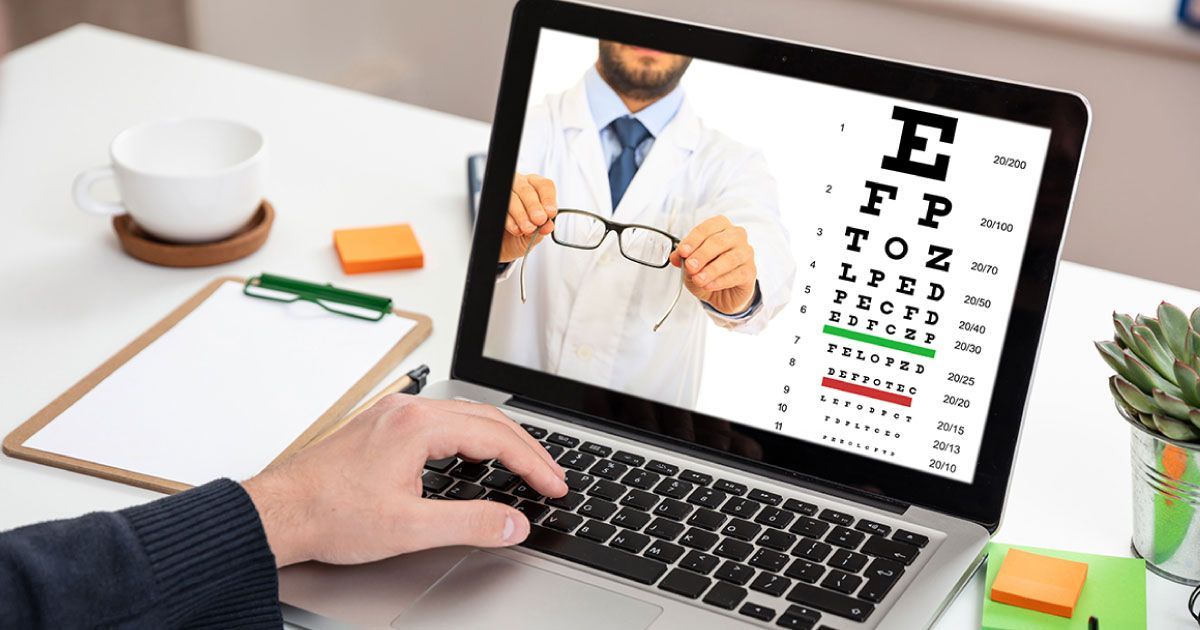The Weight Loss Craze: Do Weight Loss Drugs Put Your Eyes at Risk?

Read time: 6 minutes
In the world of weight management, the pursuit of an effective and sustainable solution has led to the emergence of various pharmaceutical interventions. Among the latest buzzworthy treatments are Ozempic, Wegovy, Saxenda, Trulicity, and Adlyxin – drugs initially developed for the treatment of type 2 diabetes but have recently gained popularity as weight loss aids. While these medications have demonstrated impressive results in promoting weight loss, their potential impact on eye health has raised concerns among eyecare experts and professionals.
Understanding GLP-1 Receptor Agonists
GLP-1 receptor agonists are a class of medications that mimic the action of a naturally occurring hormone called glucagon-like peptide-1 (GLP-1). GLP-1 plays a crucial role in regulating blood sugar levels. By mimicking GLP-1, these medications can effectively lower blood sugar and promote weight loss.
Some of the commonly prescribed GLP-1 receptor agonists include:
- Ozempic (Semaglutide): Initially approved for the treatment of type 2 diabetes, Ozempic has gained popularity for weight loss due to its demonstrated efficacy and relatively mild side effects.
- Wegovy (Semaglutide): A higher-dose version of Ozempic, Wegovy is specifically indicated for chronic weight management. It offers a more potent effect on weight loss compared to Ozempic.
- Saxenda (Liraglutide): Another GLP-1 receptor agonist, Saxenda is approved for both type 2 diabetes treatment and chronic weight management. It is administered daily as a subcutaneous injection.
- Trulicity (Dulaglutide): Trulicity has gained recognition for its effectiveness in managing blood sugar levels. Similar to other GLP-1 receptor agonists, it may also contribute to weight loss. Trulicity is administered via a subcutaneous injection on a weekly basis.
- Adlyxin (Lixisenatide): Adlyxin is another GLP-1 receptor agonist that aids in controlling blood glucose levels. While primarily designed for diabetes management, it may also have implications for weight control. Adlyxin is administered as a daily subcutaneous injection.
Assessing the Risks: A Personalized Approach
Because of the potential risks associated with Ozempic, Wegovy, Saxenda, Trulicity, and Adlyxin, a personalized assessment by a healthcare professional must be performed before being considered for these weight-loss medications.
Factors that your doctor will consider include:
- Medical Conditions: The doctor will evaluate any medical conditions you may have, including kidney problems, pancreatitis, a history of diabetic retinopathy, or a family history of medullary thyroid carcinoma (MTC). This assessment is essential for determining the potential risks and benefits of GLP-1s, as certain medical conditions may warrant caution or alternative treatment options.
- Diabetic Status: If you are diabetic, your doctor will assess your diabetic status which is crucial in determining the appropriateness of these drugs and managing potential interactions with existing diabetes treatments.
- Allergies: Your doctor will consider your allergies to semaglutide or any ingredients in these medications. This is to prevent adverse reactions and ensure that is safe for you and will be well-tolerated. Allergic responses to GLP-1 drugs can range from mild to severe.
- Medications: Considering all medications you are currently taking is vital to avoid potential drug interactions. The doctor needs to ensure that there are no conflicting effects between any GLP-1 and other prescription or over-the-counter drugs, vitamins, or herbal supplements you are using.
- Age: Age is a significant consideration as the effects and potential risks of medications can vary among different age groups. Older adults may be more susceptible to the eye-related side effects of these medications. Additionally, the use of GLP-1 drugs in individuals under the age of 18 is not currently approved.
- Pregnancy and Breastfeeding: Pregnancy and breastfeeding status are critical factors in prescribing these medications. Safety during pregnancy and potential effects on a developing fetus or a breastfeeding infant must be thoroughly assessed. In many cases, alternative weight management strategies may be considered if you are pregnant or breastfeeding.
Potential Eye-Related Risks
While Ozempic, Wegovy, Saxenda, Trulicity, and Adlyxin have shown promise in weight loss, their systemic effects can potentially impact various organs, including the eyes. The most notable concern is the potential for these drugs to exacerbate or worsen existing diabetic retinopathy, a complication of diabetes that damages blood vessels in the retina, leading to vision loss.
Research suggests that GLP-1 receptor agonists may influence the development or progression of diabetic retinopathy. Studies have shown that these drugs can cause retinal swelling and fluid accumulation, potentially worsening existing retinopathy.
Some of the common eye-related side effects include:
- Blurred Vision: This is a temporary side effect that usually resolves on its own. However, it may be more common in older adults with diabetes.
- Worsening of Diabetic Retinopathy: Diabetic retinopathy is a complication of diabetes that can damage the blood vessels in the eyes. GLP-1 receptor agonists may worsen diabetic retinopathy in individuals who already have the condition.
- Macular Complications: These complications affect the macula, the part of the eye responsible for central vision. GLP-1 receptor agonists have been linked to an increased risk of macular edema and diabetic macular degeneration.
Other potential eye-related risks associated with these medications include:
- Dry Eyes: These medications can cause dryness and irritation of the eyes.
- Increased Risk of Cataracts: Some studies have suggested that GLP-1 receptor agonists may increase the risk of developing cataracts, a clouding of the lens of the eye that can impair vision.
- Macular Edema: Macular edema is a swelling of the macula, the part of the eye responsible for central vision. This condition can lead to vision loss.
- Other Vision Changes: Other vision changes, such as double vision and seeing flashes of light, have also been reported.
- Serious Eye Conditions: In rare cases, these medications could cause inflammation of the iris (iritis) or uvea (uveitis) and retinal detachment
Other Negative Side Effects
In addition to potential eye risks, GLP-1 receptor agonists can cause a range of other negative side effects, including:
- Gastrointestinal Side Effects: These are the most common side effects of these medications and can include nausea, vomiting, diarrhea, constipation, and abdominal pain.
- Hypoglycemia: Ozempic, Wegovy, and Saxenda can cause low blood sugar levels, especially when taken with other medications that lower blood sugar.
- Pancreatitis: This is a serious inflammation of the pancreas. While rare, it has been reported in some people taking these medications.
- Gallbladder Problems: These medications can increase the risk of gallstones and gallbladder inflammation.
- Allergies: Serious allergic reactions to these medications, including anaphylaxis, have been reported.
Overall, the potential risks and negative side effects should be carefully considered before starting these medications for weight loss. It is important to have a personalized discussion with your healthcare provider to assess your individual risk factors and determine if these medications are right for you.
Alternative Weight Management Strategies
While GLP-1 receptor agonists offer a promising approach to weight loss, it is essential to consider alternative strategies that pose fewer risks to eye health. These include:
- Lifestyle modifications: Adopting a healthy diet, engaging in regular physical activity, and managing stress levels can significantly contribute to weight loss.
- Behavioral therapy: Seeking guidance from a behavioral therapist can help address underlying factors that contribute to weight gain and develop sustainable weight management strategies.
The Takeaway
The potential eye risks associated with weight loss medications like Ozempic, Wegovy, Saxenda, Trulicity, and Adlyxin highlight the need for a personalized assessment before considering these drugs. The link between GLP-1 receptor agonists and diabetic retinopathy raises concerns that should be discussed with a healthcare provider. Considering alternative strategies like lifestyle modifications and behavioral therapy, which pose fewer risks to eye health, is essential. Overall, a thoughtful evaluation of the risks and benefits is crucial for individuals seeking effective and safe weight management solutions.
If you are suffering from diabetic retinopathy and are considering starting any weight loss medications or regimen, you should discuss the risks and benefits with your optometrist at your next eye exam. Make an appointment today at Urban Optiks Optometry in San Diego.
Share this blog post on social or with a friend:
The information provided in this article is intended for general knowledge and educational purposes only and should not be construed as medical advice. It is strongly recommended to consult with an eye care professional for personalized recommendations and guidance regarding your individual needs and eye health concerns.
All of Urban Optiks Optometry's blog posts and articles contain information carefully curated from openly sourced materials available in the public domain. We strive to ensure the accuracy and relevance of the information provided. For a comprehensive understanding of our practices and to read our full disclosure statement, please click here.


















